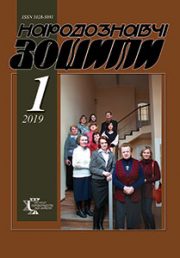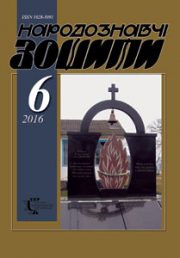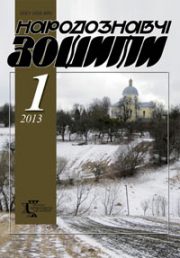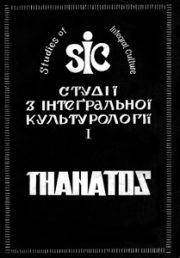The Ethnology Notebooks. 2023. № 4 (172), 1121—1133
UDK [398.22(=161.2)-055.2:323.282(47+57)]:355.425.4 (477.8)”194/196″
DOI https://doi.org/10.15407/nz2023.04.1121
PASTUKH Nadiia
- ORCID ID: https://orcid.org/0000-0001-7703-5541
- Candidate of Philological Sciences (Ph. D. in philology),
- Senior Researcher at the Ethnology Institute
- of the National Academy of Sciences of Ukraine,
- 15, Svobody Avenue, 79000, Lviv, Ukraine,
- Contacts: e-mail: npastukh@gmail.com
Abstract. In the article based on the material of folklore narrative texts about the criminal actions of the Soviet regime and the German occupiers against the Ukrainian nation in the 1940s–1960s, about the people’s resistance to these crimes and about the armed struggle of the Ukrainian Insurgent Army, the author analyzes the women’s experience that women experienced personally, that they observed or heard about it from others, and therefore that they verbalized within the parameters of the folklore tradition, with an emphasis on so-called “women’s history”.
The research is based on the materials of folklore records, which the author of the article recorded together with her colleague Olga Kharchyshyn in Zastavna district of the Chernivtsi region (2018), Nadvirna district of the Ivano-Frankivsk region (2019) and in Starosambir district of the Lviv region (2021) and which are stored in the Archive of the Institute of Ethnology of the National Academy of Sciences of Ukraine; as well as Yevhen Lunyo’s records, presented in his collections of memories about the insurgent movement in Yavoriv region.
The relevance of the article is due to insufficient attention to the female aspect of the folklore narrative tradition about the mentioned historical events, as well as the lack of folkloristic interest in stories and memories from the lives of ordinary people due to the «weak folklore nature» of such texts.
The object of the research is folk narratives, folk stories and (occasionally) legends heard from women about women’s everyday experience during the war, the commission of crimes against the Ukrainian nation, the development of the insurgent struggle and resistance in the 40s—60s of the XX century.
The subject is the peculiarities of the construction of a female folklore text on such a topic in contrast to a male text, the strategies used by women to convince the listener of the truthfulness of their testimonies, and the main folklore motifs and plots, the creator, performer and main character of which are women.
Keywords: woman, women’s experience, gender characteristics, crimes against Ukrainians, resistance, Ukrainian Insurgent Army (UPA), «banderas».
Received 24.07.2023
REFERENCES
- Kis’, O. (2016). Ukrainian National Liberation Movement as a Challenge for a Normative Femininity: Women’s Experiences in the Nationalist Guerilla War in the 1940—50s. Ethnic History of European Nations (Issue 48, pp. 61—78) [in Ukrainian].
- Bilyi, V. (1925). The Story of a Peasant About How He Sought His Rights from the Denikin’s Followers. Ethnographic Bulletin, 1, 37—40 [in Ukrainian].
- Oleksieva, O.V., & Bilyi, V.V. (1925). Short Songs («chastushki») from 1917—1925. Ethnographic Bulletin, 1, 22— 36 [in Ukrainian].
- Bilyi, V. (1926). «Autobiography or Memories of the Revolution». Ethnographic Bulletin, 2, 63—67 [in Ukrainian]
- Levchenko, M. (1926). Peasants’ Stories About the Times of the Civil War in Ukraine. Ethnographic Bulletin, 2, 68—75 [in Ukrainian].
- Kis’, O. (2017). Ukrainian Women in the Gulag: Survival as Victory. Lviv: Institute of Ethnology of the National Academy of Sciences of Ukraine [in Ukrainian].
- Uliura, H. (2008). Theoretical and Methodological Foundations of Gender Studies in Literary Studies. Gender literary studies: a study guide. Zaporizhia: Zaporizhzhya National University [in Ukrainian].
- Holubets’, O., & Sokil, V. (Ed.). (2018). Girl. In: Sokil, V. The Ukrainian Folkloristic Encyclopedia (Pp. 219—222) [in Ukrainian].
- Kuzmenko, O. (2018). Dramatic Human Existence in Ukrainian Folklore: Conceptual Forms of Expression (the Period of WWI and WWII). Lviv: Institute of Ethnology of the National Academy of Sciences of Ukraine [in Ukrainian].
- Lunio, Ye. (2005). Yavoriv Region in the Insurgent Struggle. Stories of Participants and Eyewitnesses (Vol. 1). Lviv [in Ukrainian].
- Lunio, Ye. (2015). Yavoriv Region in the Insurgent Struggle. Stories of Participants and Eyewitnesses (Vol. 2). Lviv [in Ukrainian].
- Lunio, Ye. (2021). The Insurgent Struggl in the Stories of Participants and Eyewitnesses (Vol. 3). Lviv; Drogobych: Kolo [in Ukrainian].







